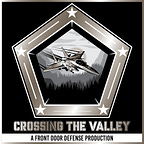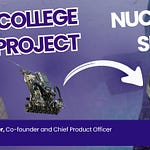How Onebrief is Revolutionizing Military Decision-Making
About Grant
Grant DeMaree founded Onebrief after serving on joint task forces in Liberia during the Ebola crisis and later in Iraq. As a second lieutenant in Liberia, Grant witnessed how the military's decision-making processes were lagging three months behind the movement of the Ebola virus, resulting in treatment units being built in locations where they were no longer needed. This experience led him to sketch his first solution concept on a napkin, driven by the realization that "these are human lives being lost because of decision speed."
Grant took the unconventional path of founding a company immediately after leaving the service, despite receiving advice to pursue graduate school or gain experience at an established company first. His conviction came from deeply understanding the problem: military staffs are the decision engines of the Department of Defense, but they're slow, inefficient, and larger than they need to be.
About Onebrief
Founded approximately six years ago, Onebrief has created a collaborative software platform designed to transform how military staffs plan operations and make decisions. The company's product enables faster decision cycles, improved decision quality, and greater staff efficiency across echelons and commands.
It took a few years of iteration for Onebrief to achieve product-market fit, but today their solution is deployed on multiple networks including NIPR, SIPR, JWICS, and CENTRIX. They've experienced explosive growth, with operational usage increasing at a 5,700% annualized rate in the most recent quarter. According to one study the company conducted, staffs using Onebrief operate approximately twice as fast and twice as efficiently as those using traditional tools.
The company's journey to success wasn't linear. Before securing their first customer, Grant and his co-founder Rafa conducted over 200 discovery calls and organized 19 self-hosted "exercises" where military planners would voluntarily spend their Saturdays testing the prototype. These exercises created a feedback loop that allowed the company to improve its product without having classified access or contracts.
Onebrief's first major contract came only after moving heaving and earth to get the software deployed: Grant somehow secured approvals to bring a specially-prepared commercial laptop into a SCIF (sensitive compartmented information facility). This unorthodox entry point enabled them to demonstrate value in real-world military planning processes, including a major Pacific exercise and a contingency plan for a major adversary.
Key Takeaways
Deep User Research Precedes Product Development: Before building their solution, Onebrief conducted over 200 discovery calls across the military hierarchy. This comprehensive approach to understanding the problem space enabled them to create a product that addressed genuine pain points rather than surface-level symptoms. When users could feel this depth of understanding in the product, it created confidence that "we're very serious about this." For founders in regulated or complex domains, this level of customer discovery is not optional—it's essential.
Create Your Own Testing Grounds: When faced with the barrier of working in classified environments, Onebrief created their own solution by hosting Saturday "exercises" where military planners would voluntarily test their product. By developing fictional scenarios and comparing performance between traditional tools and their prototype, they gathered vital user feedback despite having "no traction, no money raised, no users." This creative approach to market entry demonstrates how founders can overcome seemingly impossible barriers to customer access through innovative thinking.
The First Contract is About Strategic Value, Not Revenue: Onebrief's first contract was a tale of knowing “we're going to lose money on this, and it's fine." The value came from securing their facilities clearance, gaining network sponsorships, and establishing credibility. However, they strategically negotiated key terms: the government would pay the prime contractor's fee, Onebrief maintained direct communication with end users, and they retained full intellectual property rights. For defense startups, understanding which contractual terms are negotiable even from a position of weakness can protect long-term value.
Focus on Customer KPIs, Not Just Features: Onebrief defines success not by software adoption but by improving their customers' key performance indicators: decision speed, decision quality, and staff efficiency. This outcome-oriented approach aligns the company's incentives with user needs and enables value-based pricing. "What Onebrief is selling is less software for your staff and more a promise to make your staff's KPIs better." This clarity of purpose informs everything from product development to customer success strategies.
Scale Through Relentless Customer Success: When Onebrief experienced a potentially "company-killing" technical issue during a major planning event, they assembled a global response team working across time zones to deploy a fix overnight. The customer "woke up the next morning, not knowing about any of this and just went and did their thing." This obsession with customer success—where the primary use of venture funding is ensuring current customers achieve their goals—has driven their exponential growth through word-of-mouth within military commands.
Onebrief demonstrates that even the most bureaucratic and security-conscious institutions can be transformed by well-designed software when founders combine deep domain expertise with relentless customer focus and creative go-to-market strategies. Their approach to crossing the valley shows that sometimes the most direct path is not an option—but founders who understand the problem deeply enough can find alternate routes to success.
For more on Grant: https://www.linkedin.com/in/gkdemaree/
For more on Onebrief: https://www.onebrief.com/
For more Crossing the Valley: valleycrossers.com











